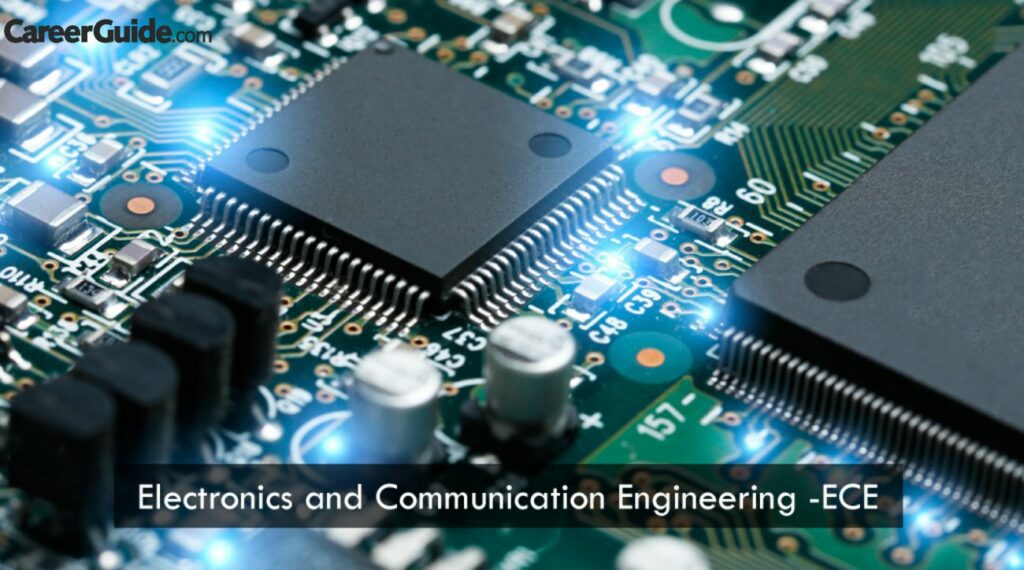Research, design, development, and testing of electronic equipment utilised in diverse systems are all part of electronics and communications engineering (ECE). Engineers in electronics and communications also design communications and broadcast systems and supervise their production.

This area of engineering focuses on microwave engineering, satellite communication, antennae, wave progression, fundamental electronics, microprocessors, solid-state devices, digital and analogue communication, analogue integrated circuits, and analogue transmission. Additionally, it deals with the production of electronic components, circuits, and communications technology. Numerous colleges in India offer undergraduate and graduate programmes in electronics and communications that result in the BTech (4 years) and MTech (2 years) degrees, respectively.
- Electronics And Communication Engineering
- Highlights Of Electronics And Communication Engineering
- Electronics And Communication Engineering Requires Certain Skills.
- Electronics And Communication Engineering: Top Entrance Exams
- Syllabus For Electronics And Communication Engineering
- Popular ECE UG Courses In India
- Top Colleges For ECE
- ECE: Top Recruiters
NIRF top engineering colleges 2023
Highlights of Electronics and Communication Engineering
Eight semesters make up the Electronics & Communication programme. Some of the course’s significant highlights are highlighted in the list below.
Highlights | Details |
| Course Level | Undergraduate |
| Duration | Four years |
| Examination Type | Semester-wise |
| Admission Process | Entrance exam based |
| Course Fee | INR 2-3 lakh |
| Average Starting Salary | INR 10 lakh |
| Top Recruiting Companies | Bharat Electronics Limited (BEL), Bharat Heavy Electricals Limited (BHEL), Hindustan Petroleum Corporation Limited(HPCL) are a few government companies. Other MNCs like Havells India Ltd, Bajaj Electronics, The Kirloskar Electric Company Limited, Honeywell or Hail (Honeywell Automation India Limited), 3M India, Philips Electronics India, Bosch in India. |
| Job Positions | Electronics Engineer, Electronics and Communication Engineer, Electronics Design & Development Engineer, Desktop Support Engineer, System Control Engineer |
download Universities/colleges cutoff
certain skills require for (ECE).
Candidates must have the following abilities in order to pursue a career in electronics and communication :
| Teamwork | A methodical mind |
| Attention to detail | Aptitude for Mathematics |
| Innovation | Time management |
| Communication | Project management |
| Strong IT skills | Inter-personal skills |
NIRF top engineering colleges 2023
Electronics and Communication Engineering: Top Entrance Exams
| JEE Main Joint Entrance Examination (Main) | JEE advanced |
| GATE (Graduate Aptitude Test in Engineering) | Bihar Combined Entrance Competitive Examination or BCECE |
| Jharkhand Common Entrance Competitive Exam or JEECE | UPSEE (Uttar Pradesh State Entrance Examination) |
| AP EAMCET (Andhra Pradesh Engineering, Agriculture & Medical Common Entrance Test) | TS EAMCET (Telangana State Engineering, Agriculture & Medical Common Entrance Test) |
download Universities/colleges cutoff
Syllabus for (ECE)
The four-year ECE programme is divided into 8 semesters. See the electronics and communication semester-by-semester schedule below. Please be aware that each college may have a different syllabus.
Semester I | Semester II |
Engineering Mathematics – I | Elements of Mechanical Engineering |
Engineering Mathematics – II | Basic Electronics & Communication Engineering |
Engineering Physics | Basic Electronics |
Engineering Chemistry | Constitution of India and Professional Ethics |
Programming in C and Data structures | Environmental Studies |
Computer Programming Laboratory | Engineering Physics Lab |
Elements of Civil Engineering & Engineering Mechanics | Engineering Chemistry Lab |
Computer Aided Engineering Drawing | Workshop Practice |
Semester III | Semester IV |
Engg. Mathematics – III | Engg. Mathematics – IV |
Analog Electronic Ckts | Microcontrollers |
Logic Design | Control Systems |
Network Analysis | Signals & Systems |
Electronic Instrumentation | Fundamentals of HDL |
Field Theory | Linear ICs & Applications |
Analog Electronics Lab | Microcontrollers Lab |
Logic Design Lab | HDL Lab |
Semester V | Semester VI |
Management and Entrepreneurship | Digital Communication |
Digital Signal Processing | Microprocessors |
Analog Communication | Microelectronics Circuits |
Information Theory & Coding | Antennas and Propagation |
Fundamentals of CMOS | Operating Systems |
VLSI | Advanced Communication Lab |
DSP Lab EC | Microprocessor Lab |
Analog Communication | – |
Lab + LIC Lab | – |
Semester VII | Semester VIII |
Computer Communication Networks | Wireless Communication |
Optical Fiber Communication | Digital Switching Systems |
Power Electronics | Project Work EC |
Embedded System Design | Seminar EC |
VLSI Lab | – |
Power Electronics Lab | – |
NIRF top engineering colleges 2023
Popular Electronics & Communication Engineering UG Courses in India
UG Courses
- BE / BTech
- UG Diploma
- BCA
- BSc
download Universities/colleges cutoff
Top Colleges for Electronics and Communication Engineering
- Indian Institute of Technology (IIT), Roorkee
- Indian Institute of Technology (IIT), Guwahati
- National Institute of Technology (NITK), Surathkal
- National Institute of Technology (NIT), Warangal
- Indian School of Mines (ISM), Dhanbad
- National Institute of Technology (NIT), Trichy
ENTRANCE EXAM QUESTIONS
Frequently Asked Questions
Core subjects in ECE typically include Analog and Digital Electronics, Communication Systems, Electromagnetic Theory, Signal Processing, Microprocessors, VLSI Design, Digital Signal Processing, and Control Systems.
Important skills for ECE professionals include a strong understanding of electronics, programming and coding skills, problem-solving abilities, analytical thinking, communication skills, teamwork, and adaptability to new technologies.
Yes, Electronics and Communication Engineers can work in the IT industry, particularly in roles related to hardware design, networking, embedded systems, and telecommunications.
After completing a degree in ECE, students can pursue higher education such as a Master’s degree (M.Tech/MS) in specialized areas like Communication Systems, VLSI Design, Signal Processing, Robotics, or pursue research by enrolling in a Ph.D. program.













